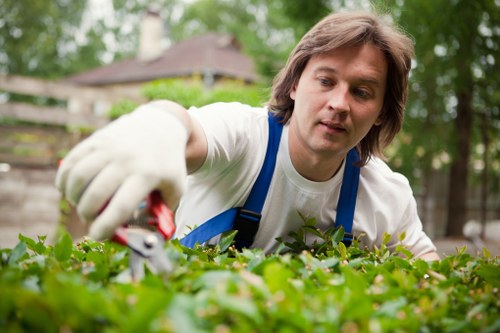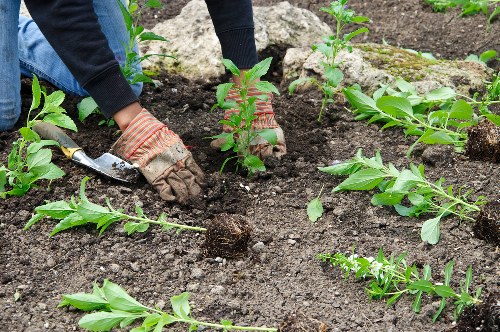Landscaping in Canary Wharf

Canary Wharf, renowned as a major business district in London, is not just a hub for commerce and finance but also a testament to modern urban landscaping. The integration of green spaces within this bustling area plays a pivotal role in enhancing the aesthetic appeal, promoting environmental sustainability, and improving the overall quality of life for residents and professionals alike.
The importance of effective landscaping in Canary Wharf cannot be overstated. With its high-rise buildings and dense infrastructure, green spaces provide a much-needed breath of fresh air, offering a serene escape from the hectic city life. These landscaped areas are meticulously designed to balance functionality with beauty, ensuring that both employees and visitors can enjoy a pleasant environment.
Landscaping in Canary Wharf involves a combination of innovative design, sustainable practices, and the use of diverse plant species. From vertical gardens adorning office buildings to expansive parks and recreational areas, the landscape design here is a blend of nature and modernity.

One of the standout features of Canary Wharf's landscaping is its focus on sustainability. The use of native plants not only reduces maintenance costs but also supports local biodiversity. Additionally, sustainable landscaping practices such as rainwater harvesting, green roofs, and energy-efficient lighting contribute to the district's overall environmental goals.
The area's parks and gardens are designed to be both functional and inviting. Whether it's a quiet spot for relaxation, a playground for children, or a venue for community events, these green spaces cater to a wide range of needs. The thoughtful placement of seating areas, walking paths, and recreational facilities ensures that every inch of the landscape is utilized effectively.
Urban landscaping in Canary Wharf also emphasizes resilience against climate change. By incorporating drought-resistant plants, efficient irrigation systems, and stormwater management solutions, the district ensures that its green spaces are both beautiful and durable, even in the face of changing weather patterns.

The role of landscaping extends beyond aesthetics and sustainability. It also plays a crucial part in the mental and physical well-being of individuals. Studies have shown that access to green spaces can reduce stress, improve concentration, and encourage physical activity. In the context of Canary Wharf, where professionals often work long hours, landscaped areas offer a perfect retreat for relaxation and rejuvenation.
Moreover, landscaping contributes to the overall property value and attractiveness of Canary Wharf. Well-maintained gardens and green spaces make the area more appealing to potential businesses and investors, fostering a vibrant and prosperous community. The visual appeal of lush landscapes against the backdrop of modern skyscrapers creates a unique and inviting atmosphere.
Community engagement is another key aspect of landscaping in Canary Wharf. Many projects involve collaboration with local residents, businesses, and environmental groups to ensure that the green spaces meet the needs of the community. This collaborative approach not only enhances the quality of the landscaping but also fosters a sense of ownership and pride among the locals.

Technological advancements have significantly influenced the landscaping practices in Canary Wharf. The use of smart irrigation systems, landscape management software, and eco-friendly materials has streamlined maintenance processes and improved the efficiency of green space management. These technologies ensure that the landscapes are not only beautiful but also sustainable and cost-effective.
In addition to natural landscapes, Canary Wharf also incorporates artistic elements into its outdoor spaces. Sculptures, water features, and interactive installations add an extra layer of interest and engagement, making the green areas more dynamic and appealing to visitors.
The future of landscaping in Canary Wharf looks promising, with ongoing investments in green initiatives and innovative design concepts. As the area continues to grow and evolve, the emphasis on high-quality landscaping will remain a priority, ensuring that Canary Wharf remains an exceptional example of urban green space integration.

For businesses looking to establish a presence in Canary Wharf, investing in quality landscaping is essential. A well-landscaped environment not only enhances the workplace experience for employees but also creates a positive impression for clients and partners. Professional landscaping services can help tailor green spaces to meet specific corporate needs, ensuring that the aesthetic and functional aspects are perfectly balanced.
Residents in Canary Wharf also benefit from the extensive landscaping efforts. From community gardens to recreational parks, the green spaces provide ample opportunities for outdoor activities, social interactions, and community building. These areas serve as communal hubs where people can connect, relax, and engage in various leisure activities.
In conclusion, landscaping in Canary Wharf is a multifaceted endeavor that significantly contributes to the district's appeal, sustainability, and livability. By integrating innovative design principles, sustainable practices, and community-focused initiatives, Canary Wharf sets a benchmark for urban landscaping. Whether you are a business, resident, or visitor, the meticulously crafted green spaces in Canary Wharf offer a harmonious blend of nature and modern urban living.
The Benefits of Professional Landscaping Services
Engaging professional landscaping services in Canary Wharf brings numerous advantages. Experts in the field understand the unique challenges of urban environments and can design spaces that are both functional and aesthetically pleasing. They have the expertise to select the right plant species, ensuring that the landscapes thrive in the specific climatic conditions of Canary Wharf.
Professional landscapers also ensure that maintenance is carried out efficiently, keeping the green spaces in pristine condition year-round. From regular pruning and planting to implementing sustainable practices, their services help in maintaining the beauty and health of the landscapes.
Furthermore, professional landscaping can help in optimizing the use of space in densely built-up areas like Canary Wharf. By creatively designing vertical gardens, rooftop terraces, and compact green zones, landscapers make the most of available space, contributing to the overall green footprint of the district.
Design and Planning
Effective landscaping begins with thoughtful design and planning. Professional landscapers collaborate with clients to understand their vision, needs, and budget. They then create detailed plans that outline the layout, plant selection, and features of the green space.
- Customized Designs: Tailoring the landscape design to fit the specific requirements of the space and the preferences of the client.
- Sustainable Practices: Incorporating eco-friendly materials and techniques to promote environmental sustainability.
- Efficient Space Utilization: Maximizing the use of available space through creative design solutions.
Implementation and Maintenance
Once the design is finalized, the implementation phase involves the actual creation of the landscaped space. This includes planting, installing features like pathways and water bodies, and setting up irrigation systems.
Maintenance is equally important to ensure that the landscapes remain healthy and attractive. Regular upkeep activities such as weeding, pruning, fertilizing, and pest control are essential for the longevity of the green spaces.
Professional landscapers also provide ongoing support and monitoring, making adjustments as needed to adapt to changing conditions and ensure the sustained health of the plants and features.
Technology in Landscaping
Modern technology plays a significant role in enhancing landscaping practices. Smart irrigation systems, for instance, use sensors to monitor soil moisture levels and adjust watering schedules accordingly, conserving water and ensuring optimal plant health.
Additionally, landscape management software helps in planning, tracking maintenance activities, and analyzing the performance of green spaces. These technological tools aid in making informed decisions and improving the efficiency of landscaping operations.
Green roofs and vertical gardens are other technological advancements that contribute to the innovative landscaping landscape in Canary Wharf. These features not only add to the aesthetic appeal but also provide practical benefits such as insulation, air purification, and noise reduction.
Choosing the Right Landscaping Company
Selecting the appropriate landscaping company is crucial for achieving the desired results. When choosing a provider in Canary Wharf, consider the following factors:
- Experience and Expertise: Look for companies with a proven track record in urban landscaping and a portfolio of successful projects in similar settings.
- Comprehensive Services: Ensure that the company offers a wide range of services, from design and installation to maintenance and sustainability consulting.
- Customer Reviews and Testimonials: Positive feedback from previous clients can indicate the reliability and quality of the company's services.
- Sustainability Practices: Choose companies that prioritize eco-friendly practices and sustainable materials in their projects.
- Communication and Collaboration: Effective communication is key to ensuring that the landscaping project aligns with your vision and requirements.
By thoroughly evaluating potential landscaping companies based on these criteria, you can ensure a successful partnership and a beautiful, functional green space in Canary Wharf.
Budget Considerations
Budget is an important factor to consider when planning landscaping projects. It is essential to have a clear understanding of the costs involved and to work with a company that can provide transparent pricing.
Discussing your budget upfront allows the landscaping company to propose solutions that align with your financial constraints without compromising on quality. Additionally, investing in high-quality materials and professional services can result in long-term savings by reducing maintenance costs and enhancing the durability of the landscapes.
Some companies offer flexible payment plans or financing options, making it easier to manage the expenses associated with large-scale landscaping projects. It is advisable to obtain detailed quotes and compare them to make an informed decision.
Return on Investment (ROI)
While landscaping involves an upfront investment, it can offer significant returns in various forms. Well-designed green spaces can increase property values, making them a worthwhile investment for property owners and businesses.
Moreover, the benefits of enhanced aesthetics, improved air quality, and increased functionality contribute to a better work environment and higher occupant satisfaction. These factors can lead to increased productivity and reduced absenteeism, providing additional value to businesses.
For residential properties, landscaped gardens offer recreational spaces and improve the overall living experience, making properties more attractive to potential buyers or renters.
Maintenance Costs
Ongoing maintenance is an important aspect to consider when evaluating the ROI of landscaping projects. Regular upkeep ensures that the landscapes remain healthy and attractive, prolonging the life of plants and features.
While maintenance involves additional costs, investing in quality services and sustainable practices can help minimize expenses over time. Automated irrigation systems, durable materials, and native plant species are some strategies that can reduce maintenance efforts and costs.
Additionally, proactive maintenance can prevent more significant issues in the future, such as plant diseases or structural damages, further contributing to cost savings.
Trends in Urban Landscaping
Urban landscaping is continually evolving, with new trends emerging to address the changing needs of cities and their inhabitants. In Canary Wharf, several key trends are shaping the future of landscaping:
- Biophilic Design: Integrating natural elements into urban environments to foster a connection between people and nature.
- Smart Green Technologies: Utilizing technology to enhance the efficiency and sustainability of green spaces.
- Community-Centric Spaces: Designing landscapes that encourage social interactions and community engagement.
- Resilient Landscaping: Creating landscapes that can withstand environmental challenges and adapt to climate change.
- Edible Landscapes: Incorporating food-producing plants into urban landscapes to promote local food sourcing.
These trends reflect a growing emphasis on sustainability, community well-being, and innovative design solutions in urban landscaping.
By staying abreast of these trends, landscaping professionals in Canary Wharf can deliver cutting-edge solutions that meet the evolving needs of the community and enhance the urban landscape.
Embracing these trends not only keeps the landscapes fresh and modern but also ensures that they remain practical and beneficial for the residents and businesses that utilize them.
Biophilic Design in Canary Wharf
Biophilic design focuses on incorporating natural elements into built environments to improve human well-being and productivity. In Canary Wharf, this approach is evident in the extensive use of greenery in office buildings, public spaces, and residential areas.
Elements such as indoor gardens, living walls, and ample natural light are common features that align with biophilic principles. These elements help reduce stress, enhance cognitive function, and create a more pleasant living and working environment.
Additionally, biophilic design promotes environmental sustainability by increasing green coverage and supporting local ecosystems. This harmonious blend of nature and architecture exemplifies modern urban landscaping at its best.
Smart Green Technologies
Technological advancements are revolutionizing urban landscaping in Canary Wharf. Smart irrigation systems, for example, optimize water usage by adjusting watering schedules based on weather forecasts and soil moisture levels.
Landscape management software allows for efficient planning, monitoring, and maintenance of green spaces. These technologies streamline operations, reduce costs, and enhance the overall effectiveness of landscaping efforts.
Furthermore, innovations such as solar-powered lighting and automated maintenance equipment contribute to the sustainability and efficiency of landscaped areas, making them more eco-friendly and cost-effective.
Community-Centric Spaces
Designing landscapes that foster community interaction is a key trend in urban landscaping. In Canary Wharf, parks and communal gardens are designed to encourage socialization, hosting events, and providing spaces for relaxation and leisure activities.
These community-centric spaces enhance the social fabric of the district, creating opportunities for residents and workers to connect, collaborate, and engage in shared activities. Such environments contribute to a sense of belonging and enhance the overall quality of life.
Additionally, incorporating elements like playgrounds, sports facilities, and outdoor seating areas ensures that the landscapes cater to diverse groups and their varying needs.
Environmental Impact of Landscaping
Landscaping has a profound impact on the environment, particularly in urban settings like Canary Wharf. Properly designed and maintained green spaces contribute to environmental sustainability in several ways:
- Air Quality Improvement: Plants absorb carbon dioxide and release oxygen, enhancing air quality and reducing pollution levels.
- Temperature Regulation: Green spaces help mitigate the urban heat island effect by providing shade and cooling through evapotranspiration.
- Stormwater Management: Landscapes with permeable surfaces and vegetation can absorb and manage rainwater, reducing runoff and preventing flooding.
- Biodiversity Support: Diverse plant species support local wildlife, promoting biodiversity and ecosystem health.
- Carbon Sequestration: Plants capture and store carbon, helping to offset greenhouse gas emissions.
By integrating these environmental benefits, landscaping in Canary Wharf plays a crucial role in creating a more sustainable and resilient urban environment.
Air Quality and Pollution Control
Urban areas are often plagued by high levels of air pollution due to traffic, industrial activities, and other factors. Landscaping helps in combating this issue by filtering pollutants and producing clean air.
Trees and plants act as natural air purifiers, capturing dust, particulate matter, and harmful gases like nitrogen oxides and sulfur dioxide. This leads to improved air quality, benefiting the health of residents and workers.
Moreover, green spaces can serve as barriers, reducing the spread of pollutants and creating healthier urban environments.
Temperature Regulation
The urban heat island effect is a significant concern in cities, where concrete and asphalt surfaces absorb and retain heat, leading to higher temperatures. Landscaping mitigates this effect by providing shade and through the cooling process of evapotranspiration.
Trees and vegetation cool the air by releasing moisture, reducing the ambient temperature and creating more comfortable microclimates. This not only benefits human comfort but also reduces the energy consumption of buildings by lowering the need for air conditioning.
Strategically placed greenery can effectively manage and balance urban temperatures, contributing to a more livable and sustainable cityscape.
Stormwater Management
Effective stormwater management is essential in preventing flooding and maintaining water quality in urban areas. Landscaping practices like creating rain gardens, permeable pavements, and green roofs help in managing rainwater efficiently.
These green infrastructure solutions allow rainwater to infiltrate the ground, reducing runoff and preventing the overloading of drainage systems. Additionally, vegetation and soil act as natural filters, removing contaminants from the water before it reaches water bodies.
By implementing these practices, Canary Wharf enhances its resilience against heavy rainfall and extreme weather events, ensuring the sustainability of its urban environment.
Case Studies of Landscaping Projects in Canary Wharf
Several notable landscaping projects in Canary Wharf highlight the district's commitment to green space integration and sustainability:
Canary Wharf Park
Canary Wharf Park is a prime example of successful urban landscaping. Spanning over several acres, the park features a variety of plant species, water features, and recreational facilities. It serves as a central gathering place for community events and provides a peaceful retreat amidst the skyscrapers.
The park's design emphasizes sustainability, incorporating rainwater harvesting systems, solar lighting, and native plants that require minimal maintenance. Its pathways and seating areas are thoughtfully placed to encourage exploration and relaxation.
Additionally, the park supports local biodiversity, providing habitats for birds and insects, and contributing to the ecological balance of Canary Wharf.
Marshgate Park
Marshgate Park is another exemplary landscaping project that combines aesthetic beauty with environmental functionality. The park features lush greenery, walking trails, and open spaces for sports and leisure activities.
One of the standout features of Marshgate Park is its innovative use of green roofs and vertical gardens, which add to the visual appeal while promoting sustainability. The park also incorporates smart irrigation systems, ensuring efficient water usage and plant health.
Community engagement was a key component in the development of Marshgate Park, with local residents actively participating in the planning and maintenance processes. This collaborative approach has fostered a sense of ownership and pride among the community members.
Hall's Yard Bar and Kitchen Garden
Hall's Yard Bar and Kitchen is renowned for its beautifully landscaped garden, which serves both as a dining space and a sustainable food source. The garden features a variety of herbs, vegetables, and flowers, showcasing the potential of edible landscaping in urban settings.
The establishment employs organic gardening practices, promoting healthy, chemical-free produce. The garden not only enhances the dining experience by providing fresh ingredients but also acts as a green oasis for patrons to enjoy.
By integrating an edible garden into its design, Hall's Yard Bar and Kitchen demonstrates the versatility and benefits of incorporating food-producing plants into urban landscapes.
Maintenance and Sustainability Practices
Maintaining landscaped areas in an urban environment like Canary Wharf requires a commitment to sustainable practices and efficient maintenance strategies. Key aspects include:
- Sustainable Irrigation: Implementing water-efficient irrigation systems to minimize water usage.
- Eco-Friendly Materials: Using recyclable and sustainable materials for pathways, seating, and other landscape features.
- Integrated Pest Management: Adopting environmentally friendly pest control methods to protect plant health.
- Regular Maintenance: Ensuring that landscaped areas are kept tidy and healthy through consistent upkeep.
- Monitoring and Evaluation: Continuously assessing the health and performance of green spaces to make necessary adjustments.
These practices not only ensure the longevity and beauty of the landscapes but also contribute to the overall sustainability goals of Canary Wharf.
Sustainable Irrigation Solutions
Water conservation is a critical aspect of sustainable landscaping. In Canary Wharf, smart irrigation systems equipped with moisture sensors and weather-based controllers adjust watering schedules based on real-time data, ensuring that plants receive the necessary water without wastage.
Rainwater harvesting systems collect and store rainwater, which is then used for irrigation purposes. This reduces dependency on municipal water supplies and promotes the use of natural water resources.
Drip irrigation and soaker hoses are also employed to deliver water directly to the plant roots, minimizing evaporation and runoff. These methods ensure efficient water usage, preserving this precious resource while maintaining healthy landscapes.
Eco-Friendly Materials
The choice of materials used in landscaping can significantly impact the environment. In Canary Wharf, there is a strong emphasis on using eco-friendly materials that are durable, recyclable, and non-toxic.
Materials such as reclaimed wood, recycled metal, and natural stone are preferred for constructing pathways, seating areas, and other landscape features. These materials not only reduce the environmental footprint but also add a unique aesthetic appeal to the landscapes.
Additionally, biodegradable mulches and organic fertilizers are used to improve soil health and support sustainable plant growth.
Integrated Pest Management (IPM)
Pest control is managed through Integrated Pest Management (IPM) strategies, which prioritize non-chemical methods to protect plant health. This includes the use of natural predators, biological controls, and mechanical methods to manage pest populations.
By reducing the reliance on chemical pesticides, IPM promotes a healthier ecosystem, safeguarding beneficial insects and preventing soil and water contamination.
Regular monitoring and early detection of pest issues allow for timely and targeted interventions, ensuring that landscapes remain healthy and vibrant without compromising environmental integrity.
The Role of Landscaping in Corporate Environments
In a business hub like Canary Wharf, the role of landscaping extends to enhancing corporate environments. Well-designed green spaces contribute to employee well-being, productivity, and corporate image.
Many companies in Canary Wharf invest in on-site gardens, green rooftops, and outdoor seating areas to provide employees with spaces for relaxation and informal meetings. These green areas offer a break from the conventional office setting, fostering creativity and reducing stress.
Furthermore, sustainable landscaping practices align with corporate social responsibility goals, showcasing a company's commitment to environmental stewardship and sustainability.
Employee Well-Being
Access to green spaces has been linked to improved mental health and job satisfaction among employees. In the high-pressure environment of Canary Wharf, landscaped areas provide a necessary respite, allowing employees to unwind and recharge.
Features such as walking paths, meditation gardens, and outdoor lounges encourage physical activity and mindfulness, contributing to overall well-being and reducing burnout.
By prioritizing employee well-being through landscaping, companies can foster a positive work culture and enhance workforce retention.
Enhancing Productivity
Studies have shown that incorporating natural elements into workspaces can boost productivity and cognitive function. Exposure to greenery and natural light enhances concentration, creativity, and problem-solving abilities.
Landscaped terraces and breakout areas provide conducive environments for brainstorming sessions, team collaborations, and casual interactions, fostering innovation and efficiency.
Additionally, the presence of green spaces can reduce absenteeism by promoting healthier lifestyles and reducing stress-related illnesses.
Corporate Image and Sustainability
Incorporating sustainable landscaping practices reflects positively on a company's image, demonstrating a commitment to environmental responsibility. This not only appeals to environmentally conscious clients and partners but also enhances the company's reputation in the community.
Green buildings and eco-friendly landscapes are increasingly becoming differentiators in the competitive business landscape of Canary Wharf. Companies that prioritize sustainability through their landscaping efforts can leverage this as a unique selling point, attracting top talent and fostering client trust.
Moreover, sustainable landscaping aligns with global sustainability goals, contributing to broader efforts in combating climate change and promoting environmental conservation.
Conclusion
Landscaping in Canary Wharf is a multifaceted discipline that significantly enhances the district's aesthetic appeal, environmental sustainability, and overall livability. Through innovative design, sustainable practices, and community-focused initiatives, the integration of green spaces within this bustling urban environment exemplifies the harmonious coexistence of nature and modernity.
Whether for corporate environments, residential areas, or public spaces, effective landscaping contributes to improved mental and physical well-being, higher property values, and a stronger sense of community. As Canary Wharf continues to evolve, the emphasis on quality landscaping ensures that it remains a vibrant, sustainable, and desirable place to live and work.
If you're looking to transform your space in Canary Wharf, contact us today to explore how our professional landscaping services can bring your vision to life. Book your service now and contribute to a greener, more beautiful Canary Wharf.